The Rev. Dr. Margaret Bullitt-Jonas preached on July 14, 2019, at St. John’s Episcopal Church, Williamstown, MA, on “A plumb line in our midst: When we stop pretending about climate change.”
Author Archives: mbj
Shocked and helpless, I watched the live-stream as Notre Dame Cathedral went up in flames. Fire spread across the roof and the church’s mighty spire toppled and fell. Crowds gathered in Paris that spring night to weep and pray, to sing hymns and bear witness. Meanwhile, hundreds of fire fighters struggled to extinguish the fire, and another hundred removed artwork and sacred relics. I felt as if I were holding my breath with millions of others around the world as we waited to learn the fate of what some people consider a spiritual and cultural treasure.
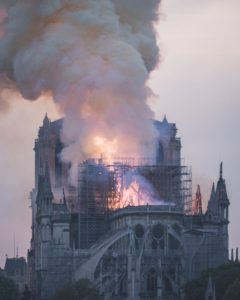
Firefighters risking everything eventually brought the flames under control, and, some twelve hours after it began, the fire was snuffed out. We awoke the next morning to study the ruins and to give thanks for what was still standing: bell towers, pipe organs, and rose windows.
Rebuilding began.
But Notre Dame is not the world’s only holy place: every culture has equally precious places that mediate the transcendent. Every mosque and temple is sacred, every shrine and synagogue, and every storefront church.
And so, too, are the lands and waters of indigenous peoples sacred. Where is the protest and grief as these lands are destroyed?
The fire in Notre Dame – literally, “Our Lady” – is over. But the fire on Mother Earth rages on.
The cathedral of life is being torched before our eyes. Year by year, temperatures worldwide continue to rise, setting new records for heat. Ice caps are melting; glaciers are thinning; even the deep oceans are warming. We who are middle-aged were born into a planetary cathedral blessed with a glorious profusion of alpine meadows and coral reefs, ice shelves and wetlands, soaring forests and expansive estuaries – a beautiful, complex, fragile, and resilient sanctuary that allowed life to flourish. But that living architecture is being rapidly dismantled as the climate crisis heats up. More than half the world’s population of animals has vanished since 1970, in part because of climate change.
The web of life is going up in smoke, as the climate grows increasingly inhospitable to all life, including humans. And the people who are least responsible for climate change – low-income communities, indigenous communities, people of color, and the historically marginalized – are suffering first and hardest.
Climate arson
The Intergovernmental Panel on Climate Change (IPCC) warns that we have only a small window of time – perhaps twelve years – in which to transform our economies and make a decisive change of course away from fossil fuels and toward clean, renewable sources of energy.
Otherwise, the Earth could scorch and the cathedral of life could collapse. But already, around the world, the effects of climate change are disastrous: rising seas, massive droughts, extreme weather events, the spread of vector-borne diseases, and millions of climate migrants forced to leave their homelands.
As of this writing, the cause of the fire in Notre Dame is still unknown. By contrast, the cause of our planetary fire is well understood. For more than 30 years scientists have been sounding the alarm about the dangerous effects of burning coal, gas, and oil.
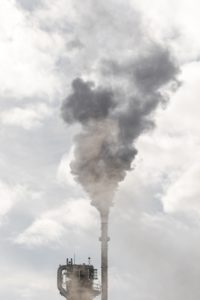
And Exxon has known this for even longer – since the 1960’s. Did it change its business model? No. Did it chart a new course and invest in clean, renewable energy? No. Instead, Exxon and other Big Polluters funded climate deniers and think-tanks that deny climate science; blocked protections that would promote clean, safe, renewable energy; confused the public by spreading misinformation; and poured billions of dollars into the effort to persuade us that fossil fuels are the answer to our energy needs.
It was a global effort to block policy – national and international – that would address the climate crisis. In fact, according to a startling new report, lobby groups representing some of the world’s biggest fossil fuel corporations have been crowding UN climate talks for decades and using the negotiations to push their agenda.
Despite Big Polluters’ extensive campaign of climate disinformation, people in the U.S. are finally beginning to see through the lies. As a result, the fossil fuel industry is taking a new tack: greenwashing. Eager to be perceived as environmentally friendly and as contributing to the common good, Exxon and other fossil fuel corporations present themselves as “energy” companies that are as devoted to providing power from sunshine and wind as they are to burning fossil fuels. (For a while, BP even tried to persuade the public that its brand was “Beyond Petroleum.”)
In actuality, developing power from sun and wind is only a miniscule part of coal and oil and gas reserves of the fossil-fuel companies, and the countries that act like fossil-fuel companies. They already hold perhaps five times the amount of coal, gas, and oil that, if burned, would further fuel the already raging climate chaos. And they continue to explore aggressively for more oil and gas. They have every intention of burning it.
If fossil fuel corporations are successful in carrying out their business plans, which require unlimited expansion of markets and ever-increasing extraction and burning of fossil fuels, they will destroy life as it has evolved on this planet, including humans.
Determined to douse the fire
I watched helplessly as Notre Dame Cathedral caught fire, but we don’t have to be helpless spectators of climate change. We don’t have to settle for standing wretchedly on the sidelines, wringing our hands. Instead, we can take responsibility for protecting our earthly cathedral, both as individuals and as members of society.
As individuals, we can learn to live more gently and lovingly in the cathedral of life. We can do everything possible to cut back sharply on our use of fossil fuels and to make wiser choices around energy.
As members of society, we can make an even greater difference. The climate emergency requires more than incremental or individual solutions: it requires bold, decisive action and systemic change. The time has come to rein in the corporate and political powers that are making huge profits by treating people and planet alike as disposable. Unless we stop them, they will extract and burn every last ounce of coal and every last drop of oil and gas until the Earth is laid waste.

That’s where the crucial work of the non-profit organization Corporate Accountability comes in: it campaigns to hold Big Polluters accountable for knowingly fueling and denying climate change. Along with a majority of the American public, Corporate Accountability understands that the fossil fuel industry bears a burden of responsibility for the harm caused by global warming and should pay for the damages.
Uplifted by a vision of a more just and life-giving society in which all people can thrive, Corporate Accountability is organizing to stop Big Polluters from writing the rules and is holding them accountable for the crisis they have fueled.
It’s time to become as focused as a fire fighter and to figure out not only how to douse the flames but also how to stop the band of arsonists that continues to fuel the fire.
Let’s say you know an arsonist – someone who is lighting and pouring gasoline on countless fires, but denying any responsibility for the havoc they cause. And let’s say you are a firefighter who is struggling to extinguish one of those fires. What if that arsonist dressed himself up like a firefighter, approached you, and earnestly claimed to be “part of the solution”? Would you let him anywhere near the building you were trying to save? Of course not! You’d probably grab his arm, hold him back, and cry out for someone to take him to court.
That’s exactly what Corporate Accountability is doing: organizing to move attorneys general around the country to investigate Exxon for its decades of climate deception. An arsonist posing as a firefighter is still an arsonist and needs to be restrained. What’s more, an arsonist who has raked in billions of dollars from setting a cathedral alight must be required to pay for the damage.
The climate crisis threatens everything we love. With that great love pouring into our hearts – our love for our children, our love for birdsong and whale-song, our love for clean air and clean water and for all the conditions that allow life to flourish on this planet – it’s an honor to stand with Corporate Accountability. I hope that you will join me in supporting their mission to confront the fossil fuel industry and hold it accountable. We intend to do everything in our power to save the living cathedral that God entrusted to our care.
##
This essay is also posted at Corporate Accountability’s Website here.
A plumb line in our midst: When we stop pretending about climate change
“This is what the Lord God showed me: the Lord was standing beside a wall built with a plumb line, with a plumb line in his hand. And the Lord said to me, ‘Amos, what do you see?’ And I said, ‘A plumb line’” (Amos 7:7).That interested me, this image of God standing beside a wall, holding up a plumb line to see whether or not the wall was straight and could stand. So I went on the Internet and learned that plumb lines are useful in a great many fields. A plumb line, or something like it, can be essential if you want to build a house or build a ship, or if you want to make a level wall or draw a good map. Carpenters use plumb lines, and so do stonemasons, astronomers and geographers.
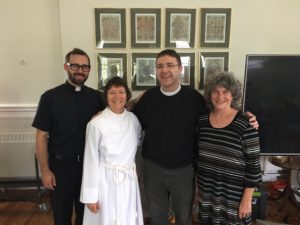
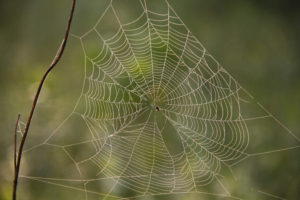
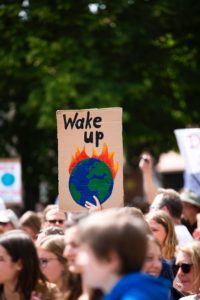
How To Preach on the Green New Deal: Margaret contributed one of the tips to this resource for preaching
Below is a statement about biomass that I gave at a public hearing held by The Massachusetts Department of Energy Resources (DOER) in Springfield on June 5, 2019.
My name is Rev. Dr. Margaret Bullitt-Jonas. I’m an Episcopal priest with an ecumenical job. I serve as Missioner for Creation Care for the 375 churches of the Massachusetts Conference of the United Church of Christ, and also for the Episcopal Diocese of Western Massachusetts, which stretches from Worcester to the border of New York State and whose diocesan headquarters are located right here in Springfield.
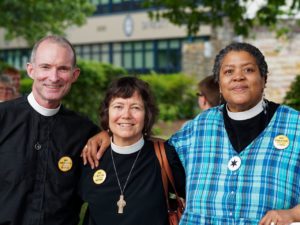
Arlington Street Church [Unitarian Universalist], Boston), Rev. Dr. Margaret Bullitt-Jonas, & Rev. Leslie K. Sterling (Rector, St. Bartholomew’s Episcopal Church, Cambridge) prepare to testify at DOER hearing. Photo credit: Rene Theberge.
Forests are sacred spaces, not spaces to make a fortune. Trees matter. They sequester carbon, and the latest IPCC report makes it abundantly clear that in order to avert climate chaos we must protect and enlarge our forests, not cut them down. It’s absurd to claim that burning intact trees is carbon neutral because new trees will grow back some day.
The truth is that logging releases an immediate pulse of carbon into the atmosphere that will take years for young trees to absorb – and there’s no way to re-freeze the polar caps and the glaciers that will have vanished in the meantime.
It’s also absurd to claim that incinerating trees is a form of clean energy, for inefficient biomass power plants actually release more CO2 per unit of energy than coal-fired power plants do. If humanity manages to survive on this planet, it will be thanks in part to the forests that we leave intact and to the new forests that we plant.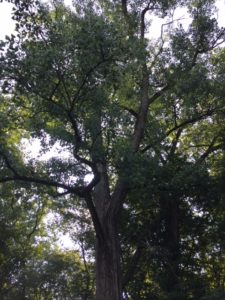
Trees are essential to human health and survival. Trees are also essential to the human spirit. Biblical scholars point out that there is a tree on the first page of Genesis and on the last page of Revelation – the first and last pages of the Bible. There is a tree in the first psalm, and the Bible refers to its wisdom as a Tree of Life (Proverbs 3:18). Jesus calls himself the true vine (John 15:1).
Love calls me – the God of life calls me – to stand with trees, to stand with all our brother-sister beings that are so swiftly being destroyed by an economic system that heedlessly devours the web of life that God entrusted to our care.
I call upon Governor Baker and his administration to drop plans to count incineration as renewable energy. I call upon Governor Baker and his administration to stop renewable energy subsidies for all biomass and trash incineration in our state.
For trees and the Bible, read Matthew Sleeth, Reforesting Faith: What Trees Teach Us About the Nature of God and His Love for Us (Colorado Springs: WaterBrook, 2019).
For information on biomass in Massachusetts, visit Partnership for Policy Integrity.
ROOTED & RISING: VOICES OF COURAGE IN A TIME OF CLIMATE CRISIS is now available for pre-order! Click here to reserve your copy.
Love in a time of climate emergency
We have a wonderful text to reflect on this morning, a passage from the Gospel of John. The scene is the Last Supper, and Jesus is beginning to say goodbye. He knows that his life is about to be cut short and that the next day he will die. So Jesus gathers with his friends for a final meal, and in an act of humble service, he washes their feet. Then, as Judas steps out into the night to betray him, Jesus turns to the gathered circle and says those familiar words: “Little children, I am with you only a little longer. You will look for me; and as I said to the Jews so now I say to you, ‘Where I am going, you cannot come.’ I give you a new commandment, that you love one another. Just as I have loved you, you also should love one another. By this everyone will know that you are my disciples, if you have love for one another” (John 13:13-35).
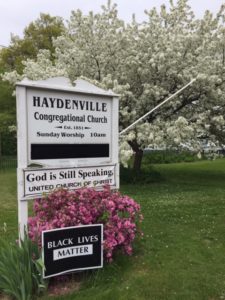 These are urgent and tender words, the words of someone facing death and eager to convey what really matters. “Little children, love one another.” I’m told that in John the Evangelist’s old age, that was the basic message he brought to one community of faith after another: “Little children, love one another.” After spending time with Jesus, and after years of meditating on Jesus’ life and teaching, on Jesus’ crucifixion and resurrection, the aging evangelist could find no more direct route into the heart of the Gospel than simply to say, “Little children, love one another.”
This brings to mind a poem by Michael Leunig:1
There are only two feelings. Love and fear.
There are only two languages. Love and fear.
There are only two activities. Love and fear.
There are only two motives, two procedures,
two frameworks, two results.
Love and fear.
Love and fear.
As followers of Jesus, we may be called to love, but I don’t for a moment believe that we’re not also well acquainted with fear. I remember my childhood fears, such as my fear of the monsters lurking under the bed, and how important it was not to let even one toe stick out beyond the edge of the mattress. I remember my fear that when my parents went out at night, they might not come back. I remember my fear of the swarm of bees that nested near the front door; my fear, during piano recitals, that I might forget which note came next; my fear that I might be chosen last for the softball team, or, what’s worse, that the ball might actually come hurtling in my direction and – dreadful thought – all my team-mates would count on me to catch it.
The fears of a child gradually morph into the fears of an adult, and even though we grownups may go to a great deal of trouble not to appear anxious or afraid, most us face some kind of fear every day. Fears come in all shapes and sizes. What are you afraid of? Chances are excellent that several of us fear the same thing. And we know what that’s like: how, when frightened, we hold our breath, our bellies clench and our hearts race.
There’s a lot of fear going around these days, and we have reason to worry. In addition to our personal fears, we feel a collective shudder about the state of the world, from the assault on women’s reproductive rights to the harsh treatment of immigrants. For me, it’s the ecological crisis that wakes me up at night, for scientists are reporting with increasing concern that the web of life is unraveling before our eyes and that human civilization is at risk of collapse. Just think of it: the number of animals around the world has plummeted by over half in less than 50 years, mostly by the development of great swaths of land and the destruction of habitat. Human activity has wiped out 60% of the world’s mammals, reptiles, amphibians, birds, and fish since 1970. Alarmed scientists are describing what they call a “biological annihilation,” and one expert commented: “This is far more than just being about losing the wonders of nature, desperately sad though that is…This is actually now jeopardizing the future of people. Nature is not a ‘nice to have’ – it is our life-support system.” A few weeks ago, a sweeping new report from the U.N. spoke about the possible extinction of as many as one million plant and animal species in the near future.
And then there’s the climate crisis. Burning fossil fuels like coal, gas, and oil is pushing the planet to break new records for heat, causing droughts, floods, and monster hurricanes, drowning cities, and accelerating wildfires. The people hurt first and hardest by the effects of a changing climate are the poor, and unless we change course fast, we will not be able to leave our children and our children’s children a habitable world. The U.N.’s Intergovernmental Panel on Climate Change warns that we have only a very short span of time – maybe 12 years – in which to avert a catastrophic level of global warming worldwide.
These are urgent and tender words, the words of someone facing death and eager to convey what really matters. “Little children, love one another.” I’m told that in John the Evangelist’s old age, that was the basic message he brought to one community of faith after another: “Little children, love one another.” After spending time with Jesus, and after years of meditating on Jesus’ life and teaching, on Jesus’ crucifixion and resurrection, the aging evangelist could find no more direct route into the heart of the Gospel than simply to say, “Little children, love one another.”
This brings to mind a poem by Michael Leunig:1
There are only two feelings. Love and fear.
There are only two languages. Love and fear.
There are only two activities. Love and fear.
There are only two motives, two procedures,
two frameworks, two results.
Love and fear.
Love and fear.
As followers of Jesus, we may be called to love, but I don’t for a moment believe that we’re not also well acquainted with fear. I remember my childhood fears, such as my fear of the monsters lurking under the bed, and how important it was not to let even one toe stick out beyond the edge of the mattress. I remember my fear that when my parents went out at night, they might not come back. I remember my fear of the swarm of bees that nested near the front door; my fear, during piano recitals, that I might forget which note came next; my fear that I might be chosen last for the softball team, or, what’s worse, that the ball might actually come hurtling in my direction and – dreadful thought – all my team-mates would count on me to catch it.
The fears of a child gradually morph into the fears of an adult, and even though we grownups may go to a great deal of trouble not to appear anxious or afraid, most us face some kind of fear every day. Fears come in all shapes and sizes. What are you afraid of? Chances are excellent that several of us fear the same thing. And we know what that’s like: how, when frightened, we hold our breath, our bellies clench and our hearts race.
There’s a lot of fear going around these days, and we have reason to worry. In addition to our personal fears, we feel a collective shudder about the state of the world, from the assault on women’s reproductive rights to the harsh treatment of immigrants. For me, it’s the ecological crisis that wakes me up at night, for scientists are reporting with increasing concern that the web of life is unraveling before our eyes and that human civilization is at risk of collapse. Just think of it: the number of animals around the world has plummeted by over half in less than 50 years, mostly by the development of great swaths of land and the destruction of habitat. Human activity has wiped out 60% of the world’s mammals, reptiles, amphibians, birds, and fish since 1970. Alarmed scientists are describing what they call a “biological annihilation,” and one expert commented: “This is far more than just being about losing the wonders of nature, desperately sad though that is…This is actually now jeopardizing the future of people. Nature is not a ‘nice to have’ – it is our life-support system.” A few weeks ago, a sweeping new report from the U.N. spoke about the possible extinction of as many as one million plant and animal species in the near future.
And then there’s the climate crisis. Burning fossil fuels like coal, gas, and oil is pushing the planet to break new records for heat, causing droughts, floods, and monster hurricanes, drowning cities, and accelerating wildfires. The people hurt first and hardest by the effects of a changing climate are the poor, and unless we change course fast, we will not be able to leave our children and our children’s children a habitable world. The U.N.’s Intergovernmental Panel on Climate Change warns that we have only a very short span of time – maybe 12 years – in which to avert a catastrophic level of global warming worldwide.
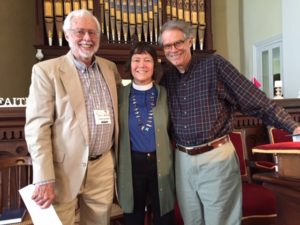
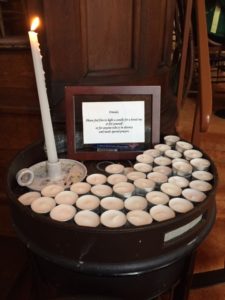 I will end with a story about love and fear.4 Back in 2001 I screwed up my courage and decided to carry out my first act of civil disobedience. That’s how I met your former pastor, Andrea Ayvazian: in Washington, DC, where she was helping to organize a new interfaith group, Religious Witness for the Earth, that was planning to protest President Bush’s intention to drill for more oil in the Arctic.
Here’s what happened: On the first day we learned about oil drilling and the Arctic, about climate change and fossil fuels. On the second we lobbied our members of Congress and studied the disciplines of non-violent civil disobedience. On the third, about a hundred of us marched down Independence Avenue in religious vestments, carrying banners and singing. When we reached the Department of Energy, an enormous stone structure surrounded by police, we held a brief worship service. So far, everything was legal. Then came the part that wasn’t. I’ll read from an essay I wrote about what that was like.
The worship service was coming to an end. We sang “Amazing Grace,” and then the twenty-two of us who had decided to risk arrest joined hands and walked slowly to the doors of the Department of Energy.
I felt us cross an invisible boundary. With the others, I stepped over a threshold I could not see. I walked out of my ordinary life.
I am neither a law-breaker nor a thrill-seeker. More often than not, I follow the rules – even enforce them. I fasten my seat belt, don’t cheat on taxes, write thank you notes, and stand up when the band plays our national anthem. But here I was, intentionally and publicly breaking the law. As if some inner revolution had quietly taken place, the old “me” was no longer in charge. Whatever security I’d felt in operating within the rules was gone. That’s partly why I felt so frightened as I left the safety of the circle and moved toward the door: I hardly recognized myself. I hardly knew who I was.
§§
We stand or kneel in prayer, our backs to the building.
The pavement under my knees is hard. At home, I often sit on a meditation cushion to pray. Today there is no cushion, just the weight of my body against stone. I lift up my hands. I’m dressed for Holy Communion. I might as well hold out my arms as I do at Communion.
Instead of pews filled with parishioners, I see ranks of police and a cluster of supporters. I am afraid. I’ve never been arrested before. Years ago, as a VISTA volunteer in Mayor Rizzo’s Philadelphia I heard countless stories of police brutality. It’s not that I really expect the same thing to happen to me – the punch in the gut, the assault behind closed doors. Still, my body tenses as I place myself against the cops, the Feds, the law.
I close my eyes. One by one we pray aloud, words thrown into space, words hurled against stone.
Is this whole thing ridiculous? I briefly open my eyes and notice a well-dressed man watching us. He strokes his tie, leans over and says something to a fellow nearby. The two of them chuckle. I have no idea what they’re talking about but I wonder if they think we look absurd. I suppose we do. Here we are with our jerry-rigged signs, our predictably earnest songs and prayers of protest, a foolhardy band straight out of the ‘60’s.
Defensively, I imagine confronting that mocking man with the arsenal of our credentials. “We’re no rag-tag bunch,” I want to tell him. “We’re people with doctorates and master’s degrees – nurses and ministers, writers and accountants. Thoughtful people, educated people, professionals.”
I am distracted from prayer by this indignant outburst. “Let it go,” wisdom tells me. “None of that matters — your degrees, your skills, your status in the world. The privileges of race and class mean nothing now. You’re a woman on your knees, that’s who you are — one human being pleading with God.”
I turn my attention back to prayer and continue to stretch out my arms. Suddenly I realize that behind the tension, behind the fear and self-consciousness, something else is welling up. I am jubilant.
“Lift up your hearts,” I might as well be saying to the people before me, beaming as broadly as I do at Communion.
“We lift them to the Lord,” would come the response.
How did I miss it? After years of going to church, after years of celebrating Communion, only now, as I kneel on pavement and face a phalanx of cops, do I understand so clearly that praising God can be an act of political resistance. That worship is an act of human liberation. The twenty-two of us come from different faith traditions, but each of us is rooted in a reality that transcends the rules and structures of this world. Tap into that transcendent truth, let the divine longing for a community of justice and mercy become your own deepest longing, and who knows what energy for life will be released?
I feel as defiant as a maple seedling that pushes up through asphalt. It is God I love, and God’s green earth. I want to bear witness to that love even in the face of hatred or indifference, even if the cost is great.
So what if our numbers are small? So what if, in the eyes of the police, in the eyes of the world, we have no power? I’m beginning to sense the power that is ours to wield, the power of self-offering. We may have nothing else, but we do have this, the power to say, “This is where I stand. This is what I love. Here is something for which I’m willing to put my body on the line.”
I never knew that stepping beyond the borders of what I find comfortable could make me so happy. That shifting from self-preservation to self-offering could awaken so much joy.
Love and fear. Love and fear. I invite you to take a moment to remember a time when you took a brave step toward fullness of life, a time when you made a decision to do the right thing, even though you knew it would be difficult or costly. Who inspired you to be bolder than you thought? With whom do you hold hands, literally or figuratively, when you step out to make a difference in the world? And if you knew you could not fail – if you were set free from fear – what would you do for the healing of our world?
Let’s take a moment in silence, and then I invite your response.
1. Michael Leunig, A Common Prayer (NY: HarperCollins, 1991).
2. David Wallace-Wells, The Uninhabitable Earth (New York: Tim Duggan Books, Penguin Random House, 2019).
3. Hafiz, quoted by Jack Kornfield, The Art of Forgiveness, Lovingkindness, and Peace (New York: Bantam Books, 2002), 83.
4. This story is adapted from part of my chapter, “When Heaven Happens,” in the anthology Heaven, ed. Roger Ferlo (New York: Seabury Books, 2007), 78-81.
I will end with a story about love and fear.4 Back in 2001 I screwed up my courage and decided to carry out my first act of civil disobedience. That’s how I met your former pastor, Andrea Ayvazian: in Washington, DC, where she was helping to organize a new interfaith group, Religious Witness for the Earth, that was planning to protest President Bush’s intention to drill for more oil in the Arctic.
Here’s what happened: On the first day we learned about oil drilling and the Arctic, about climate change and fossil fuels. On the second we lobbied our members of Congress and studied the disciplines of non-violent civil disobedience. On the third, about a hundred of us marched down Independence Avenue in religious vestments, carrying banners and singing. When we reached the Department of Energy, an enormous stone structure surrounded by police, we held a brief worship service. So far, everything was legal. Then came the part that wasn’t. I’ll read from an essay I wrote about what that was like.
The worship service was coming to an end. We sang “Amazing Grace,” and then the twenty-two of us who had decided to risk arrest joined hands and walked slowly to the doors of the Department of Energy.
I felt us cross an invisible boundary. With the others, I stepped over a threshold I could not see. I walked out of my ordinary life.
I am neither a law-breaker nor a thrill-seeker. More often than not, I follow the rules – even enforce them. I fasten my seat belt, don’t cheat on taxes, write thank you notes, and stand up when the band plays our national anthem. But here I was, intentionally and publicly breaking the law. As if some inner revolution had quietly taken place, the old “me” was no longer in charge. Whatever security I’d felt in operating within the rules was gone. That’s partly why I felt so frightened as I left the safety of the circle and moved toward the door: I hardly recognized myself. I hardly knew who I was.
§§
We stand or kneel in prayer, our backs to the building.
The pavement under my knees is hard. At home, I often sit on a meditation cushion to pray. Today there is no cushion, just the weight of my body against stone. I lift up my hands. I’m dressed for Holy Communion. I might as well hold out my arms as I do at Communion.
Instead of pews filled with parishioners, I see ranks of police and a cluster of supporters. I am afraid. I’ve never been arrested before. Years ago, as a VISTA volunteer in Mayor Rizzo’s Philadelphia I heard countless stories of police brutality. It’s not that I really expect the same thing to happen to me – the punch in the gut, the assault behind closed doors. Still, my body tenses as I place myself against the cops, the Feds, the law.
I close my eyes. One by one we pray aloud, words thrown into space, words hurled against stone.
Is this whole thing ridiculous? I briefly open my eyes and notice a well-dressed man watching us. He strokes his tie, leans over and says something to a fellow nearby. The two of them chuckle. I have no idea what they’re talking about but I wonder if they think we look absurd. I suppose we do. Here we are with our jerry-rigged signs, our predictably earnest songs and prayers of protest, a foolhardy band straight out of the ‘60’s.
Defensively, I imagine confronting that mocking man with the arsenal of our credentials. “We’re no rag-tag bunch,” I want to tell him. “We’re people with doctorates and master’s degrees – nurses and ministers, writers and accountants. Thoughtful people, educated people, professionals.”
I am distracted from prayer by this indignant outburst. “Let it go,” wisdom tells me. “None of that matters — your degrees, your skills, your status in the world. The privileges of race and class mean nothing now. You’re a woman on your knees, that’s who you are — one human being pleading with God.”
I turn my attention back to prayer and continue to stretch out my arms. Suddenly I realize that behind the tension, behind the fear and self-consciousness, something else is welling up. I am jubilant.
“Lift up your hearts,” I might as well be saying to the people before me, beaming as broadly as I do at Communion.
“We lift them to the Lord,” would come the response.
How did I miss it? After years of going to church, after years of celebrating Communion, only now, as I kneel on pavement and face a phalanx of cops, do I understand so clearly that praising God can be an act of political resistance. That worship is an act of human liberation. The twenty-two of us come from different faith traditions, but each of us is rooted in a reality that transcends the rules and structures of this world. Tap into that transcendent truth, let the divine longing for a community of justice and mercy become your own deepest longing, and who knows what energy for life will be released?
I feel as defiant as a maple seedling that pushes up through asphalt. It is God I love, and God’s green earth. I want to bear witness to that love even in the face of hatred or indifference, even if the cost is great.
So what if our numbers are small? So what if, in the eyes of the police, in the eyes of the world, we have no power? I’m beginning to sense the power that is ours to wield, the power of self-offering. We may have nothing else, but we do have this, the power to say, “This is where I stand. This is what I love. Here is something for which I’m willing to put my body on the line.”
I never knew that stepping beyond the borders of what I find comfortable could make me so happy. That shifting from self-preservation to self-offering could awaken so much joy.
Love and fear. Love and fear. I invite you to take a moment to remember a time when you took a brave step toward fullness of life, a time when you made a decision to do the right thing, even though you knew it would be difficult or costly. Who inspired you to be bolder than you thought? With whom do you hold hands, literally or figuratively, when you step out to make a difference in the world? And if you knew you could not fail – if you were set free from fear – what would you do for the healing of our world?
Let’s take a moment in silence, and then I invite your response.
1. Michael Leunig, A Common Prayer (NY: HarperCollins, 1991).
2. David Wallace-Wells, The Uninhabitable Earth (New York: Tim Duggan Books, Penguin Random House, 2019).
3. Hafiz, quoted by Jack Kornfield, The Art of Forgiveness, Lovingkindness, and Peace (New York: Bantam Books, 2002), 83.
4. This story is adapted from part of my chapter, “When Heaven Happens,” in the anthology Heaven, ed. Roger Ferlo (New York: Seabury Books, 2007), 78-81. What is an emergency? Merriam-Webster defines emergency as “an unforeseen combination of circumstances or the resulting state that calls for immediate action.” Does climate change count as an emergency? Not if an “emergency” is necessarily “unforeseen,” for when it comes to climate change, scientists have been sounding the alarm for decades, telling us that burning massive quantities of fossil fuels would lead to catastrophe. Of course, the fossil fuel industry (see #ExxonKnew) has spent millions of dollars trying to make the climate emergency as “unforeseen” as possible, for as long as possible, to as many people as possible. But the clock has run out. The time of reckoning is at hand. Foreseen or unforeseen, the climate crisis is upon us and it calls for immediate action.
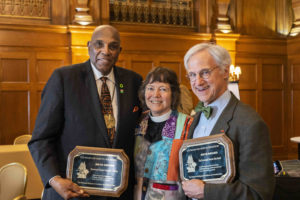
In the same week that the U.K. became the first country to declare “an environment and climate emergency,” and in the same week that the Anglican Communion became, as far as I know, the first global religious body to recognize a climate emergency, National Religious Coalition for Creation gathered for its 20th annual prayer breakfast in Washington, DC. NRCCC is a group composed of members of major faith groups in America, including Catholic, Protestant, Evangelical, and Orthodox Christians, and Jews. After opening prayers, a lively presentation by Chad Hanson (Director of the John Muir Project) on forest protection as an essential aspect of addressing climate change, and the bestowal of the 2019 Steward of God’s Creation award to two outstanding climate champions – the Rev. Dr. Gerald L. Durley and the Rev. Dr. Jim Antal – we moved outside to announce the release of Religious Declaration of Unprecedented Climate Emergency.
Religious Declaration of Unprecedented Human Emergency clarifies two essential facts: humanity has an extremely short window of time in which to avert irreversible climate chaos, and religions around the world consider protecting God’s Creation a moral and spiritual imperative.
Perhaps it was fitting that the Religious Declaration was publicly announced in Pershing Park, a National World War I Memorial. Just as William James and Jimmy Carter spoke of “the moral equivalent of war,” so, too, are increasing numbers of citizens realizing that we need to address climate change with the same focus, fervor and self-sacrifice of a nation that is mobilized to fight a war.
The stakes are high. As stated in the opening lines of the Religious Declaration, climate change is unlike any other challenge that confronts humanity, “because it is largely irreversible ‘for 1,000 years after emissions stop’ with ‘profound impacts on global climate, ecosystems and human societies for the next ten millennia and beyond.’1 The shocking truth is that decisions we make now could, in the words of climate economist Ross Garnaut, ‘haunt humanity until the end of time.’2 Nuclear war, while also irreversible, is only a possibility. Human-induced climate change is underway now, and its impacts are greater and more extensive than scientific models predicted. We will significantly alter the future of civilization as we know it and may eventually cause its collapse if we continue down this path.”
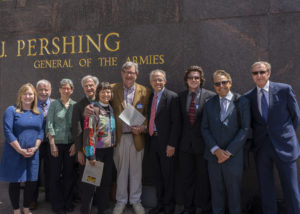
The Declaration calls for bold, concerted action: “Decades of delay on climate action have made small corrective measures and incremental approaches useless. Those who are invested in maintaining the status quo, or who put forth proposals that are clearly incompatible with what climate science demands, are condemning innocent young people – including their own children and generations to come – to a future of unimaginable suffering: the mass death of human populations and the extinction of species.”
The Declaration places the climate crisis within a moral context: “Further delay in addressing climate change is a radical evil that as people of faith we vigorously oppose.”
One of the principal writers of the document, Dr. Richard W. Miller, Professor of Philosophical Theology and Sustainability Studies, Creighton University, reflected later on this last point. He commented: “The manufacturing of doubt and the sowing of confusion about climate change by fossil-fuel-industry-funded think tanks, the deceptive climate-change reporting by ideologically-driven media outlets, the investing in fossil fuel infrastructure by banks and high-profile investors, the expansion of pipelines, oil, and gas wells are all radically evil actions that continue to this day. The institutions that engage in these actions are enemies of humanity and the web of life. We will oppose these institutions from our churches and synagogues, from our pulpits and lecterns, and from our social halls and gathering spaces. We will fill the halls of power like the young people in the Sunrise Movement in their push for a Green New Deal; we will join school-aged children in the streets striking for climate action; and we will rebel with the young people in the Extinction Rebellion in the race to head off the destabilizing of the climate system within which civilization developed.”
I, too, was one of the principal authors of the Religious Declaration, and in our press release, I commented: “God sent us into the world to bless and heal, not to ravage and destroy. But as a species we are hurtling willy-nilly down a suicidal path that risks bringing down not only our own civilization but also the web of life as it has evolved for millennia. As people of faith, we stand with the Spirit of life, who calls us to build a more just society in which all people and all God’s creatures can thrive.”
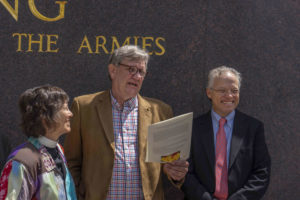
The third lead author of the Religious Declaration, inventor and tech business entrepreneur David W. Carroll, asserted: “There is no moment more critical for all-out personal and cooperative action. Today’s environmental emergency demands we implement solar and wind with power storage immediately. It is ready, and it provides unequalled economic value. Let us not fail in our duty to serve and protect Planet Earth.”
The Declaration amplifies statements that major denominations have already issued on climate change. Religious groups across the United States, including the National Council of Churches, U.S. Conference of Catholic Bishops, Central Conference of American Rabbis, National Association of Evangelicals, and the Standing Conference of Canonical Orthodox Bishops, have all called upon policymakers and elected officials to take strong action to address global climate change.
Are there risks in declaring climate change an “emergency”? I will name two. One risk is that the moment will be wasted – the proposed solutions will be weak and ineffective. A recent blog post from Council Action in the Climate Emergency (CACE) explains: “As climate emergency talking and thinking shifts further towards climate emergency action, it is imperative that ‘climate emergency’ is not co-opted to mean something ‘convenient’ or ‘pragmatic’ (i.e. weak goals and slow action). Climate emergency has to stand for safe climate principles for restoring a safe climate.” (The article, which is by Bryony Edwards, goes on to propose how to set targets for climate emergency emissions.)
A second risk in declaring a climate emergency is that political and corporate powers could thereby be given free rein to consolidate their advantages and shut out the people who suffer the most. Casey Williams, a writer in North Carolina, points out in an article for The Outline, “…Given that the American right seems to be quietly coming around to the reality of climate change (despite some high-profile acts of denial), ‘national emergency’ rhetoric and policy could easily become a conservative strategy for dealing with climate change by building ‘big, beautiful walls’ to exclude various Others from America’s relative stability. Meanwhile, the wealthy in the U.S. and around the globe will continue to erect seawalls around their coastal villas and hire private firefighters to protect their Malibu mansions. The real tragedy of treating climate change as an emergency, rather than an uneven distribution of physical and social harm, is that it would worsen the inequality that brought us to this point in the first place.”
In my view, the Religious Declaration of Unprecedented Human Emergency successfully avoids both risks. It presents a menu of effective solutions. And it also lifts up the need to tackle both the ecological and the economic crises. As Pope Francis stated in his encyclical, Laudato Si’, we need to hear both the cry of the Earth and the cry of the poor – neither one can be adequately addressed alone.
That is why Religious Declaration supports “the bold direction of the Green New Deal, or other similar science-based proposals, as an opportunity for this country to commit to stabilizing the climate while creating ‘unprecedented levels of prosperity and economic security for all people of the United States.’ This specifically includes low-income communities, communities of color, and those that have historically been marginalized or underserved. The Green New Deal is the first resolution that addresses the climate crisis with the urgency, focus, and comprehensiveness that the situation requires. Our nation mobilized every part of society during World War II and the Great Depression. Like the Greatest Generation, we must rise to the occasion and commit to doing what science says it takes to avoid irreversible catastrophic climate chaos and make a rapid and just transition to a clean energy economy.”
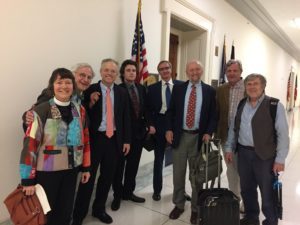
- Other interfaith groups also support the Green New Deal. GND is not a piece of legislation, but a statement of vision and values. To sign “Faith Principles for a Green New Deal” sponsored by Interfaith Power & Light, click here. To learn more about the Green New Deal and to sign a GreenFaith statement of support, click here.
The NRCCC’s Religious Declaration of Unprecedented Human Emergency has been signed by religious leaders across the country, including heads of denominations, bishops, clergy, and leaders of interfaith environmental organizations. Here are some of the religious leaders who signed the Declaration: Rev. John Dorhauer (General Minister and President, United Church of Christ); Rt. Rev. Marc Andrus (Bishop, Episcopal Diocese of California); Rt. Rev. Doug Fisher (Bishop, Episcopal Diocese of Western Massachusetts); Rt. Rev. Gregory H. Rickel (Bishop, Episcopal Diocese of Olympia, Seattle, WA); Rt. Rev. A. Robert Hirschfeld (Bishop, Episcopal Church of New Hampshire); Rt. Rev. Alan M. Gates (Bishop, Episcopal Diocese of Massachusetts); Rt. Rev. Roy F. (Bud) Cederholm Jr. (Retired Bishop Suffragan, Episcopal Diocese of Massachusetts); Rev. Fletcher Harper (Executive Director, GreenFaith); Phoebe Morad (Executive Director, Lutherans Restoring Creation); Rabbi Warren Stone (Central Conference of American Rabbis), Rabbi Benjamin Weiner (Jewish Community of Amherst, MA); Rabbi Alison Adler (Temple B’nai Abraham, Beverly, MA); Rabbi Moshe Givental (West Bloomfield, MI); Rabbi Katy Z. Allen (Jewish Climate Action Network, Wayland MA); Rev. Dr. Jim Antal (Special Advisor on Climate Justice to UCC General Minister and President); Rev. Brooks Berndt, Ph.D. (Minister for Environmental Justice, United Church of Christ); Rev. Mariama White-Hammond (Pastor, New Roots AME Church, Boston); Rev. Fred Small (Minister for Climate Justice, Arlington Street Church, Unitarian Universalist, Boston).
I will give the last word to a rabbi and a pastor. Each of them was moved to write a short response to the Religious Declaration, praying that it would reach many minds and hearts.
Rabbi Warren Stone (Central Conference of American Rabbis and Co-chair of NRCCC) wrote: “We must act boldly and with vision to stem the tides of climate change’s devastating impact on humanity and all God’s creation. May we look back on our day and age and say that we saw what was happening to the climate and we acted with courage and prescience to do what was necessary to cut our CO2 emissions and dramatically reduce the threats of climate destruction for future generations.”
The Rev. Dr. Jim Antal (Special Advisor on Climate Justice to UCC General Minister and President) wrote: “Momentum is growing as congregations from every faith tradition are shifting their focus from personal salvation to collective salvation. Along with the outspoken voices of children and youth, people of faith are declaring that we are now in a time of reckoning. To continue ‘business as usual’ as the corporate powers insist is morally bankrupt. God is calling us to re-build our economy and center our lives on sustainable, earth-restoring values and practices.”
Religious Declaration of Unprecedented Human Emergency is posted at the NRCCC Website and can be read and downloaded here.
1. Susan Solomon, Gian-Kasper Plattner, Reto Knutti, Pierre Friedlingstein, (2009) Irreversible Climate Change Due to Carbon Dioxide Emissions,” Proceedings of the National Academy of Sciences, 106 (6) 1704-1709, at 1704; DOI:10.1073/pnas.0812721106; and Peter U. Clark et al, (2016). Consequences of Twenty-First-Century Policy for Multi-Millennial Climate and Sea-Level Change.Nature Climate Change. 6.10.1038/nclimate2923.
2. http://www.garnautreview.org.au/pdf/Garnaut_Chapter24.pdf (last lines of the review)
https://cosmosmagazine.com/climate/ross-garnaut-s-bright-idea.
We know that climate change is upon us. The world is already starting to experience its effects – from extreme storms to floods, droughts, rising seas, and refugees on the move. What we may not know is that we have the power, in our own households, to make a significant difference in combating climate change. If all Americans made better choices in five areas (how we heat and electrify our homes; how we transport ourselves; what we eat; and how we deal with waste), our national carbon emissions would plummet by 40%!
The Episcopal Church is launching a new initiative, Sustain Island Home (www.sustainislandhome.org), which will give us tools to reduce our carbon emissions and make good choices in those five areas of daily life. It provides a “carbon tracker” to help us mark our progress and it aggregates our commitments, so that we can see how our personal life-style changes are contributing to the larger whole.
The carbon tracker was piloted in the Diocese of California and endorsed last summer by The Episcopal Church’s 79th General Convention (Resolution C008). The Diocese of Western Massachusetts is honored to be one of several dioceses – along with the Dioceses of Connecticut, Kansas, North Carolina, and Olympia – that will be early adopters of Sustain Island Home. We will lead the way in testing and refining the process of introducing Sustain Island Home to congregations. By Earth Day (April 22), all the dioceses of The Episcopal Church will be on board.
Lent is the perfect season for us to begin exploring Sustain Island Home. During these 40 days, we take the first step in what Presiding Bishop Michael Curry calls the Way of Love: we turn toward Jesus. We notice the ways that we have gone astray, and we turn again toward love. In Lent we re-orient ourselves to the love of God, asking ourselves: What are the habits of thought and behavior that prevent God’s love from being fully expressed in my life? How have I – deliberately or unwittingly – been caught up in the powers of greed, hatred, fear, injustice or oppression? What practices will restore me to a whole-hearted love of God and neighbor, so that I live my life more in tune with the Holy Spirit and become a bearer of God’s love?
Learning how to a carbon-neutral life – how to ditch fossil fuels and to turn toward energy efficiency, energy conservation, and clean renewable energy – is one of the most powerful and prayerful ways we can align ourselves with the love of God and neighbor, including our other-than-human kin. At a time when unchecked climate change is unraveling the web of life, what changes will you make this Lent in order to live more simply and in harmony with the rest of Creation? Take a look at the sustainislandhome.org Website and review your options. Some of the changes are easy to make; some of them ask you to stretch yourself. What is God inviting you to do, as each of us takes responsibility for sharply reining in our use of dirty fossil fuels?
While everyone should feel free to explore the Website, Sustain Island Home is intended to be used by congregations, not only by individuals. We have formed a diocesan team that would be glad to help introduce the carbon tracker to your congregation (perhaps at a coffee hour, Forum, or special event), and to diocesan groups. To bring a member of our team to your congregation for a demonstration of the Website and carbon tracker, please contact our Team Convener, the Rev. Eric Elley (phone: 860/394-8728; email: eelley (at) live.com).
I am proud to be part of a diocese that in so many ways is answering God’s call to care for Creation. I know that many of you are implementing the diocesan resolution we passed last October, “Creation Care in our Congregations: Living Lightly on God’s Good Earth,” which asks every congregation to create a “green team” and carry out an energy audit, reporting on progress before our next diocesan convention. Thank you for getting that done.
I am grateful for the enthusiastic support and prophetic leadership of Bishop Doug Fisher in our shared effort to protect – in the words of Eucharistic Prayer C – “this fragile Earth, our island home.”
With Sustain Island Home, we now have a grace-filled opportunity to accelerate and amplify our commitment to live lightly on God’s good Earth. If you visit The Episcopal Church’s Website for Creation Care, you will find a Care of Creation Pledge. I hope you will join me in making your Pledge, which can include making a commitment to explore Sustain Island Home and the carbon tracker.
If you knew that making a few simple changes today would bless your children and future generations for years to come, would you make those changes? Of course you would! I look forward to discovering how we can encourage each other to make the changes that will help us express more fully our love for God and neighbor, and our commitment to build a safer, healthier future.
The article appeared in the Winter/Spring edition of Abundant Times, a publication of the Episcopal Diocese of Western Massachusetts. A pdf version of this article, which includes photos and graphics, can be downloaded here:
Sustain Island Home.Standing up for life
I want to thank the congregations across our diocese that are moving forward to implement the resolution that our Diocesan Convention passed unanimously last October, “Creation Care in our Congregations: Living Lightly on God’s Good Earth.”
Our diocese is increasingly recognized as a Creation care leader in The Episcopal Church. Thank you for all the ways that you are stepping up to safeguard the web of life, which needs our urgent protection as never before.
Has your congregation created a Green Team? What has it done so far? Have you carried out an energy audit? As you enact the resolution, do you have any stories, surprises or suggestions you’d like to pass along to the diocese? Please send news about your progress to our magazine editor, the Rev. Vicki Ix (communications (at) diocesewma.org) – we would love to share some of it in the next issue of Abundant Times.
If your congregation has not yet enacted the resolution, now is the perfect time to get started. The resolution reminds us that we are all called to be faithful stewards of our fragile planet by taking three steps before our 118th Diocesan Convention:
1) Create a Green Team, beginning by naming one or more individuals to serve as liaison with our diocese’s Missioner for Creation Care in order to help the parish strengthen energy conservation and efficiency and encourage public advocacy around environmental issues.
2) Undertake an energy audit for all parish buildings in order to reduce the parish’s carbon footprint, keeping in mind that grants are available from the Diocese to offset half the cost of the audit. Wondering how to get an energy audit? Contact Massachusetts Interfaith Power & Light.
3) Report back to the sponsors of this resolution before the 118th Diocesan Convention on steps taken and progress made on Steps #1 and #2. Congregations should report progress and accomplishments to the following members of the General Convention Deputation:
In the Berkshire Corridor: John Cheek (cheekbass (at) gmail.com)
In the Valley Corridor: Maggie Sweeney (magsween10 (at) yahoo.com)
In the Worcester Corridor: Mac Murray (mac.murray (at) gmail.com)
Thank you, John, Maggie, and Fr. Mac, for receiving this information and for your leadership.
I look forward to connecting with a Creation care liaison (or green team) in every congregation, and to hearing about your accomplishments as you implement energy audits.
Thank you for everything you are doing – as individuals and as communities of faith – to heal God’s Creation, to cut back on fossil fuels, and to increase energy efficiency and conservation.
Every prayerful action counts. Every degree counts.
This article appeared in the WinterSpring 2019 edition of Abundant Times, a publication of the Episcopal Diocese of Western Massachusetts. A pdf version, which includes photos and stories of green teams at work in the diocese, can be downloaded here: We resolved to make a difference in 2019
